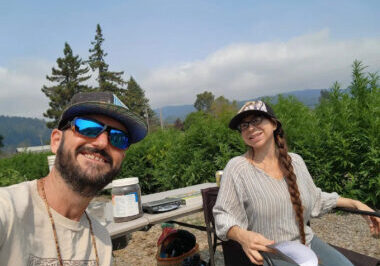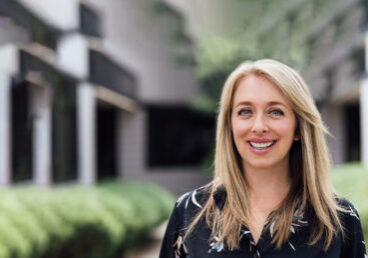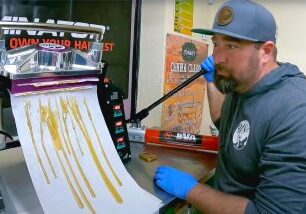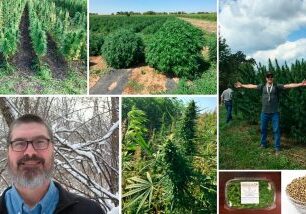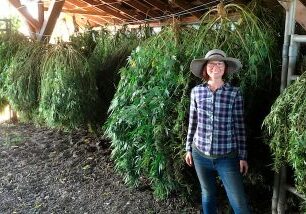In this episode, we talk with John Shute, founder of PufCreativ, about the challenges of starting up a dispensary in a new market, and get tips on cannabis marketing.
Hosted by Reed Preston, founder of Preston Hemp Co, and Dana Mosman, co-founder of Triminator.
Transcript
Reed Preston: Welcome to the Own Your Harvest Podcast. This is the second episode of season 2. I’m Reed Preston, founder of Preston Hemp Co and an ambassador for Triminator. I’ll be hosting this series along with our Triminator co-founder Dana Mossman. This episode, we’re going to be chatting with John Shute, founder of PufCreativ.
Dana Mosman: Hey, thanks Reed and yeah, super stoked to talk with John today. Obviously, branding, marketing, big part of what we do in the cannabis industry day to day and there’s a lot of kind of misinformation about that. A lot of people trying to do it on their own. So, super excited to talk to an expert in the area. So, welcome to the podcast John.
John Shute: Yeah, thanks for having me, guys. I really appreciate it. I’m honored to be here.
Reed: Awesome. Well, just right off the bat like when did you get into the cannabis industry and how
John: Yeah. It’s a pretty interesting ride and story.
I’ve been in the industry for just over 7.5 years now. How I got to the industry was right after I got my master’s degree, I was actually the operations and marketing manager for a mega nightclub in South Florida. Which is pretty interesting because I’m not really a nightclub guy. But like I absolutely crush it for them because I just came at it with a very unique approach. I wasn’t really in that scene, so I could like escape and like really have an outside perspective. But anyway, needless to say unfortunately that same year I lost a lot of friends to opiates, which is a reoccurring theme in my life but that year in particular was really tough. I was doing long-distance with my fiancé at the time. So, I was just like in a weird spot and I started doing I was already a cannabis user and really passionate about it. Because I got in trouble when I was younger.
I just kept being like this is silly like why did I get in trouble this helps me so much of creativity and stress and anxiety and my ADD and all these things in my life. I did a lot of research into like how it actually helps people get off opiates and recover from addiction and PTSD and things like that. So, I just decided, hey, I’m going to leave this awesome like job I have right now where I’m making a bunch of money and dive into something that I’m actually like passionate about and like I can actually make a difference in the world. So, I left that job. I moved back to New Jersey and then immediately applied for the only cannabis job on Indeed.com. Which was a mark and a marketing director for a cannabis contract manufacturing company in California at the time. Which 7.5 years ago was really interesting market to dive into especially from a manufacturing perspective.
So, I do have head first into that. I learned how everything works basically from seed to sale. All the relationships that need to happen in between from seed to sale. All the tech that’s like starting to be integrated at that time which now is becoming a real crazy part of the industry. Those guys completely screwed me over which is pretty common at that time and still maybe a common thing. And I dropped my wife and like a month before I got married. These guys were like, oops psych. No, like we’re not going to like all the things we offered you are not on the table now. And my intern at the time also like left her job, like moved back home with her parents, like changed her life. So, her and I were crushing so hard for these folks that we were like, hey, we’re super valuable. Like let’s just start our own thing.
So, my friend growing up who used to film us like skating and surfing and like make websites for like our offshoot T-shirt companies that we started a bunch of times. It’s like dude, I need help on like the website and content front. And that’s kind of how it started. It was like all during a game of skate like at the Denver skate park. Like just kind of like, oh we should do our own thing. Like what are we doing? And that was 6 years ago, almost 6 years ago now and that started in Denver we were pitching like $800 websites and like very minimal social media packages we’re just like we’ll take pictures for free just like, let’s build our portfolio. So, that’s how it all started for me really and I would say, we got lucky because I just knew some people from the manufacturing thing that ended up turning into clients and some random, like few public companies deals fell in our lap. We got screwed over. I learned a bunch of lessons but we always just have remained very true to like building a quality portfolio.
We’ve always been very community focused, social equity focused, environmentally focused and we just try to be good people in this like wild industry. And in my opinion, it was kind of like a harder path to take over the past 6 years, but is it better long-term approach. Because like if you’re not trying to make this industry like a better place and the world a better place, like there’s really not in your room for you in my opinion, but obviously there’s a lot of people in this industry now that like don’t even think about those things. So, I hope that was a good.
Dana: But I mean, I think I agree with your point. Like I think that people care about that right? Like people care about like under the layer. Like as you said in the onion it’s like eventually people like sniff that stuff out. I think like consumer sniffs that stuff out. Like you can’t keep doing that. It works like early and then eventually it’s like well, what are we doing here?
John: 100%. Like our whole our whole mentality was, because we started throwing like local charity events and then people were like, oh, who the hell are these PufCreativ guys? Like they came out of nowhere. And then we’re like these big events. People are coming. We started this company called Cannabis Doing Good which is doing happy hours in Denver and then we were doing after parties like with MJ Biz Daily. Then that led to us starting, then we couldn’t do events because of COVID that led to us starting a social justice nonprofit and then that led to me starting this new project we’re working on. Which is the cannabis creative movement, where we create guides with nonprofits all over the country that walked and we did just like a veteran’s wellness guide We did an anti-racism guide. We’ve done opiate awareness guide. Pretty much anything you can think about that’s going to make this world ministry a better place.
We partner with nonprofits who are really deep into those sectors and then produce these like very digestible guides for people just to take in and just start their journey of learning down that rabbit hole and how it actually circles back to cannabis. So yeah, we’ve taken that path and we’ve been building this quality portfolio and yeah like people who are like yeah, like people I talked to like 5, 6 years ago are now coming around. I’m like, dude you guys have really done it like let’s work together now. So, it’s it feels good that that’s like starting to happen and like that trickle effects happening, because that’s the direction I want to see the industry go. It’s just like good people trying to do good things, providing the consumers with quality products. There’s this harmony that really can be created and I was Before we hopped on the podcast, I was telling you guys I’m doing this retail project in New Jersey where I’m from. I live in Colorado, but from New Jersey and that’s it’s really a dream come true even though applying for a cannabis license is one of the most difficult things you could do.
It’s a dream come true because it’s I found the spot in my hometown and I already have LOI signed with like the local community colleges, local not profits, the Pinelands Reserve here. Because I want to provide the quality experience that I experience as a cannabis user where I grew up with my family and friends. But I want people to realize that they can get high and help themselves with alternative medicine while doing good things like we can all get what we need to out of this and then also like provide for our communities, get people out of prison, help our surrounding environment. Because I want to mimic that just in every in my clients’ projects and just as we expand our footprint too. Yeah, trying to lead by example but it’s tough.
Dana: You take the hard road but hopefully it lands you somewhere, right? It lands you somewhere good. It takes a long time but it’s a good foundation.
John: Totally.
Reed: We were talking before the we got on here about just sort of education and obviously, you have a ton of experience in this. But what are some things from your perspective having your experience, a wide range of experience and now going for your own license in terms of branding and marketing that you think make a good brand. We’re talking about how a lot of people just jump into the industry. I think a little now but like I used to go to shows in Oregon Washington go to any new state that just opens and you’ve got mom and pops from everywhere they’re going to make a million dollars. And like it’s because they grow the best cannabis and it’s great to grow the best cannabis but you also have to have a really good business plan and good marketing and a good story and all that. So, can you tell us what you think makes some of the lessons that you’ve learned in terms of that brand component?
John: Totally. Man, the lessons and what you can take in is its infinity I think at this point. But from what I see and what I’ve experienced is it’s a balancing act but how you should approach it is an if my advice is a realistic long-term approach to your balancing act that you’re performing in the cannabis industry. Every single company whether it’s an MSO, a mom-and-pop shop, it They’re all facing their challenges and difficulties along the way. For me personally and I was telling you guys this I dropped a blog and I’m doing an entire blog series of my experience as an application participant in a very unique state like New Jersey. that’s pretty corrupt, needless to say. And what exactly I suggest from 7+ years of marketing experience in cannabis going through the application process. What you should do to start. What you should do once you get your license. What you should do on the day to day, etcetera. I’m releasing that over the course of my experience the next year.
But early on I would say no matter what size your company is you really do need to dial in your business plan and roles. Because like you said like there’s people who’ve been growing weed or legacy growers and they have maybe the best products and are very passionate. But you’ll spend, you’ll waste so much money and so much time trying to get into the cannabis industry but then once you actually get there then what? A lot of times I see people like not really thinking about that like what actually goes into the day to day. What actually is required to actually have a successful launch? What should you spend money on before you even have your license? Because even though you maybe have your license yet, you still need to think long term. Because if you don’t set up your branding, if you don’t like have some type of momentum going and foundational aspect, once you get your license, you’re just going to be scrambling, you’re going to rush. Then you’re going to end up wasting thousands and thousands and thousands of dollars and hours and hours and hours of your time fixing these mistakes in the long term.
So, some big things that I suggest if you’re in the application process and it’s really early on. Obviously, you want to have a great team that covers every angle of your operation once you open. You’re going to want to be realistic about your financial model, yes. But from a marketing perspective, I think it’s great to spend your funds if you budgeted for a marketing and branding on actually going through a formal logo design process with an agency or professional who actually has years of cannabis experience that’s successful. Because you can waste having to go through a rebrand, having to redo packaging, having to redo signage, because you didn’t think about not looking medical in certain states, you didn’t think about your logo being large and small, you didn’t think about compliance regulations from state to state, you didn’t think about how that was going to look on the package.
So, first things first, right? That’s the first thing that you talk about is what’s my name going to be? Is there a domain in social media handles out there? That type of is free, right? You can do that research on your own. You can go see what’s realistic and then once you dial those things in, you should go through a formal process, like let’s formally put together your logo design, your colors, your fonds, let’s put together your mission, your vision, your tagline. That stuff you should spend your money and time on early on, because I’ve seen so much money and time wasted on fixing it in the future.
Next, is again that digital acquisition. Very early make sure that your domain, your handles things like that are dialed in. Maybe not necessarily start posting and doing, have it you may maybe just have a landing page or something like that, but get that stuff now. Because as soon as your competitors see that you’re in the application process, they’re going to try to steal assets, they’re going to start reporting your accounts things like that. So, it gets competitive and wow we see it all the time. Like people talk about the industry like Instagram accounts getting shut down. I would say yeah sometimes a lot of times yeah it is Instagram, but most of the time it’s competitors reporting people and there’s nothing you can do about it. Then you play this game of Cat and Mouse with meta now.
So, another thing that I really suggest early on especially because people don’t realize how important their proforma is at this point. If you have great branding and your messaging dialed in, your deck that you’re putting together for investors and raising money in the future is going to look great and be attractive. We went through our own process and created this awesome brand. Our branding’s dope. We bowed in our messaging and we we’ve been pitching our series A right now and it’s some of the biggest investors I didn’t even think we’re going to show us attention, are like, wow, like, you guys really did like spend a lot of great time on this brand. I could see it really resonating with people, right? If you identify also your partners, hey, like maybe you’re not signing contracts to people but like you’re going to need a POS system if you’re a retailer. You’re going to need an online ordering partner. If you’re a branded retail, you’re going to want some type of customer loyalty and start monetizing your data.
Those conversations are free. So, you can actually map out what your expenses are going to be once you launch and include that into your pro format and then it adds quality to your pitch deck. Because now your investors and everyone who’s getting involved in this project, they’re like, okay, wow, like, these guys have actually thought this through They have a great brand. They have their digital assets acquired. They have their partners identified. They have their pro formula laid out. Their deck looks awesome. Like that just is attractive all around. Investors, partners, if you’re a brand, retailers, if you’re a retailer, brands. So, everyone’s going to be attracted to that.
Dana: Absolutely.
John: So, those are typically like the key things I think like early on people should really consider doing because it helps them from a marketing branding perspective, yeah but it just helps all around like their business model too. Sorry, that was a lot.
Dana: No man. I know like if you’re just getting started too like I know a lot of universities and stuff if you dig around all that stuff you can find good assets available like you can find good sample business plans. You can find good financials to go off of, right? So, if you’re just building it and you don’t have that experience it’s out there. Just have to seek it out.
John: Yeah, and especially in a place like you like every state’s different in the US in regards to like how they treat MSOs. So, States like New Jersey like their rec is open right? So, locals like me are going to be playing catch up this whole time in regards to IP and capturing customer acquisition and whatnot. But like you can actually use like I like reach out to these MSOs. Hey like hey we’re going to be a retailer. What’s your guy’s wholesale pricing? And then you can see what the other people are charging include that in your pro form and how they present their wholesale information. In small net towns like here or like we’re doing a lot of work in Mississippi right now who isn’t necessarily focusing on big MSOs. There’s a lot of locals involved in that state.
You can reach out to other businesses and see what they’re doing and that’s improv. Like we’re actively helping other retailers who aren’t that far away from us just get from point A to point. Because it’s a community. If you don’t look at it as everyone’s in this together especially if you’re a local in these newer states like you’re not really going to get far. I don’t think it’s necessarily good to create enemies. It’s better to create a harmony. So, the state can function as like a smooth operation and well the best information I’ve gotten that’s been the most helpful has been from other businesses who are manufacturers other retailers in the State, who we just traded information with each other and that was free, right. I spent 30 minutes like just, oh hey, I saw you guys are going to be open up like maybe we could see synergies. And then they send me a few things, they asked me a few questions and then now I just saved 20 grand because I just saved like 10 steps, I didn’t even realize I couldn’t save.
So, I always I’m a Huge fan of like there’s a lot that you can do that just time and not money. Because a lot of times people’s biggest limitation in their mind is financial resources but a lot of the steps that you need to take aren’t really finance. It’s just it’s just time. You can spend your money on the important things like I mentioned like branding.
Reed: Yup. On the branding note like I guess marketing too because marketing is so broad right? Like there’s so much involved with it. I feel like a lot of our listeners and a lot of people out there are pretty heavily focused on like Instagram and its tricky right? Like it’s a tough game. Like Instagram, Facebook, I mean all social media apps. I know that there’s social club now.
John: Yeah, it’s getting wild out there the social media man.
Reed: Yeah.
John: It’s with like Elon Musk and stuff like.
Reed: Everything going on, but Canada typically like just posts getting flagged, accounts getting banned, like I’ve been running the Triminator page for a while and we get posts flagged all the time. Like we have a set of things like I basically have an SOP for what I’ll post and what I won’t, because like I’m worried that someone’s going to flag it or something like. Anyway, when getting to is like how big of a role do you think social media being be it Instagram or Facebook like really play on the whole marketing platform that you try and provide your clients with?
John: Probably the best question you can ask right? Because so many of my clients this isn’t for everyone right? I think a lot of people have unrealistic expectations about social media, right? We just actually invested into this very expensive analytic Platform so we could take our social media efforts to the next level because we’re constantly asking ourselves the same question you just asked, right? Like how do we monetize this? Where do we spend our time? Are this a waste of time? Are we going to get shut down? So, some fun things I’ll just shoot out. The most cannabis conversations actually happen on Twitter and Reddit, more than any other social platform out there. Instagram, Facebook, TikTok, LinkedIn, Twitter and Reddit is actually where it goes down and where people actually don’t spend any time as a cannabis company. You’re least likely to get shut down on those platforms and they have a lot of reach and you can actually track very specific conversations to your niche on those platforms.
As a whole, I think I approach things from a full marketing perspective, full-spectrum perspective. So, no matter what your business is, I think you should be on everything, right? It’s you approach each platform and where you spend your time on each platform which is like the real balancing act and that’s depending on your business model, right? So, I’ll just throw a few examples out there. I have a CBD client. We did a lot of SEO work for him and I went snowboarding with him one day. He’s like, dude, like, we’re doing good but like, why am I, like, I spend so much time on social media. I see these other CBD brands on Instagram and like I just can’t get the momentum I feel like everyone else is getting. I was like, dude, I don’t think anyone, I think it’s just all I don’t think anyone’s actually getting momentum besides.
Reed: Besides having this conversation.
John: Yeah, like besides the 6 maybe companies who are paying two hundred thousand dollars to get their Facebook ads to go through. That’s probably really it. I was like, I think that what you should do is schedule out your posts. Don’t stress about them. Don’t waste your time on there. Get into about 30 more retailers and spend your time doing that. And then talk to me in 6 months and me how you feel about your mental health and your business model. It’s been about a year and I think pretty much every month since I told him that. He’s like, dude, you completely changed my life. Like, I sleep better at night. I’m not wasting my time. I’m in 30 more retailers now. I just got into the Denver Botanical Gardens like things are taking off just because of that quick conversation we had.
Now, on the other hand, there’s if you’re a brand or like a cannabis retailer out there, social media is an important but it’s like what’s realistic for you and like what is actually going to be effective for you. So, like a lot of times people come into things like thinking they’re going to be like cookies or like weed maps like right off the back which is impossible, right? You’re not a celebrity. You don’t have millions of dollars at your disposal. You don’t even have a photographer or videographer at your disposal to pump out content like that. You’re not savvy on your phone. So, like how do you think you’re going to get to that point, right?
So, I people need to really break down like what’s realistic for you, like what can you spend on social media, how much time do you have, do you have a team, who’s that team going to be? Because unless you’re a celebrity you’re going to have those millions, you’re not going to get millions of follower’s impressions. But from a full spectrum marketing perspective., it’s good to be on those platforms. So, do what’s realistic have a presence. On Instagram and Facebook, I think it’s all about quality over quantity for cannabis companies. Make sure that you have dopiest content that actually is resonating with your audience, and make sure it’s going to convert and make sure it’s compliant so you don’t get shut down. If it’s someone reports you, you’re not going to have any issues.
Even though it’s the longer, harder route to take. In my perspective, it’s going to pay off for you in the long term because it’s way better than getting shut down. I think you can push the boundaries on those other platforms I mentioned like Twitter, Reddit, use Instagram and Facebook for influencers, right? Or some type of bigger boost with the media entity, like yeah, for example like I’m just going to let’s pick Massachusetts and let’s pick Leafily, right? Leafily, I just discovered has a really great presence in Massachusetts and a really crazy following there. So, maybe instead of like pumping out and paying 20 grand for like ten reels and a bunch of models and stuff like that that maybe isn’t really going to do anything for you. Do a targeted full-spectrum email, ad, and social media campaign with a big media company who actually has a presence in your specific area where you’re selling products. Don’t just like go with weed maps or someone and not actually look at their data. Like if they don’t have a presence there, there’s no actual target customer there like don’t do that.
So, a lot of times like for social clients for us or imagine their budgets and actually share their financial plans and stuff. We’ll create a strategy that’s very quality focused on like Instagram and Facebook and things like that and we’ll have reels going and but realistic to their budget. But the real growth that’s happening is with influencers, with SEO, with big media conglomerates. Unless you’re a celebrity or less you have that money, I mentioned that really boost your social media. Google is actually your best friend, right. Like I look at 50 different analytical reports every single month and unless it’s one of our clients that aren’t celebrity endorsed or do influencer programs. 50 to 90% of their traffic is coming from organic search. Especially if you have a great website and SEO set up the right way, and that’s no matter what if you’re a brand, retailer. A lot of times CBD companies that organic search is really going to be the majority of your traffic.
Reed: Yeah.
John: So, again it’s a big balancing act. I’m a big quality over quantity person unless you have the resources. And start thinking about these other platforms out there. Twitter, Reddit, Pinterest. That they those allow you to plug links in and have really niche conversations that you don’t really get to have on Facebook or Instagram. But again, I love Facebook and Instagram but it’s just like what’s realistic and actually going to fit your business model.
Dana: What kind of we got a little intermission here. Break a little break out of dog in the room, yeah.
John: Dog’s right.
Dana: All good. In terms for like a brand that does have limited resources. What like how would you make up your team in terms of what you’d keep internal and I know obviously we’re just talking hypothetical here but like what would you do? What would you outsource? What would you keep inside? How do you establish a team and where do you kind of draw the line? There’s expertise and then there’s sort of cost effectiveness and how would you play it?
John: Yeah, I mean it really is situational like especially for people who have limited resources. So, we try to build our plans around their internal team’s capability. So, most of the time smaller companies will have like that one human that they brought in the team who knows how to do some type of marketing because they just have no idea, right. And we call that person like the translator. Like we use them to translate what we need to get to the person who’s like signing the checks, and like so we can make this harmony work. So, we usually, I always suggest building your like external contract to someone like me around that person’s skill set. So, a lot of times like if those people aren’t good at like editing or like design or animation or strategy in the cannabis industry. Like we’ll handle those four things for them on the day to day and have a schedule of what we do, and then that person’s handling the posting, the scheduling, the DM management, the comments, things that are pretty straightforward, right? But we’re putting together the content. We’re like overseeing the captions. We’re mapping out hey this is going to be the balance of the type of content that’s going to be released. Here’s the platforms we’re going to focus on. Here’s where we’re going to plug in our analytical tools because that’s where you actually get the most traction.
So, that’s what I think is like if you’re a smaller company build, your external relationships on social media or just marketing in general around where those that person’s weak points and like not experiencing cannabises basically. Because yeah, that will save you a lot of money and like if you work with someone like us that isn’t just trying to pitch you for nothing. Like we’re not trying to waste our time either with clients like we’re like, hey, we want to do something that’s actually going to be effective for you. I’m not trying to take all your money in two months and like run like I rather have a ten-year relationship with you, right? So, I think the issue is that a lot of people in my position don’t really approach it like that. They’re just like trying to just pitch and just get someone in the pipeline and then people get dive down these rabbit holes that necessarily just are a waste end up being a waste of money and time.
Dana: Yeah, I think too like in this space there’s well in everything now to be really noticed you have to be really good especially with creatives. So, the creatives are rare to really be an elite creative if you don’t have that inside you should send that out.
John: 100%. Yeah, and that’s why I mentioned the quality over quantity right? Like I would suggest pumping out like one really good freaking reel a week that just pops off rather than like 20. Even though like if you have that capability to do 20 dope reels like wild. It’s just few and far between that people can’t afford to do that. I mean we, and like it’s even us. Like we pump out photo video but we also have partners for certain brands that want crazy content constantly. Like, we have to bring in other people and help us because it’s such a monster. So, again, it really comes back down to this like balancing act that I’m talking about that is different for everyone but if you work with the right company, you can really dial in and save money and time for sure.
Dana: For sure. What kind of inspired you to move to try for your license in New Jersey? Obviously, kind of a deviation but just curious what the driver is there.
John: Well, you know what’s funny? I’ll be completely honest. There was another agency that was like trying to partner with us and we were on like a business development call and he kept just talking about having skin in the game. He’s just like, dude, like guys like us, like we have so much experience like we should be getting pieces of all of our clients’ companies and doing all and it just sounded like shady, but I was like, man, you’re right. Like, I feel like I should have type of more skin in the game. Because usually I talk to these companies and then I’m the one like helping them fix their business models, or like it’s not really us that’s the problem ends up being. I’m like wow like they just don’t know what they’re doing.
So, I realized I could really add value and maybe it was smart to do something myself, but it wasn’t and then that company I found that was trying to just steal information from me basically it wasn’t really trying to partner with me they had bad intentions. But still made me think and then once Jersey started kind of tinkering at, hey, we’re going to get wrecked to go live, one of my childhood best friends reached out to me. He’s like, hey, like I really feel like this is my calling, I want to get involved in the industry. Do you have any idea where to start? Because I have no idea. I was like yeah; I actually do and that’s how it kind of started and then we realized that we couldn’t do it alone. Even though I have all this experience and partners.
So, my friend and also client at a time who does retail in Massachusetts. I asked if him and his team wanted to come in from like an actual experience perspective and we can kind of all combine forces. That’s how it really got started and that was like a year and a half ago and yeah, like I’m still I’ve been actively paying for my red, waiting for our approval from the State. But I have all my approvals. We just started our construction. We have like 5 or 6 like pretty serious series A investors right now. We haven’t really seen a better proforma that’s realistic out there in the market. We’re really as experienced team as we have too which we’re really excited about. But the motivation for me again is just bringing all this passion and experience I have full circle to actually provide for family and friends. Because this experience is really test of like your mental capacity and patience and just like everything that you could think of for being an entrepreneur. I’m being tested at right now.
So, if you’re not passionate or really in it for the long haul or ready for that, I wouldn’t do it. Just to be honest. Like you probably won’t be able to, because I knew what I was getting into and someone like me who has all this, it’s like just build up like trying to get progress the industry like help people like all in all these different States. Like that’s what has allowed me to like come out like and be able to breathe for a second. Where it’s like if yeah if you don’t have that like not only is it going to be hard for you to get to where I’m at which is really still nowhere. You’re not going to make it once you actually get your license. Yeah, like the next guy is just going to walk all over you and it’s going to be a rough ride.
And unfortunately, we do like there’s people that I talked to and within the first couple minutes I’m like, no, you don’t really get it. Like you don’t really know what you signed up for here. Which I was that person 7 years ago. So, I can relate. So, I try to just help people and try to really get their, like hey did you think about this or did you consider these few things just to kind of start planting those seeds. Because again if we’re going to work with people, I wanted to be long term and just I don’t want to guide people down the wrong direction and just take their money for no reason. I want all my clients to be the most successful and be very content with everything they’re doing.
Dana: Yeah. What was the funding or you know what lessons did you take from the sort of funding path?
John: Yeah, I mean, oh man, so like I didn’t do any funding for PufCreativ. That was all we pretty much started that from just scratch. Which is common for some agencies but unique for them to get to this point. So, I had no fundraising experience prior to this. One of the partners that we brought in I mentioned from Massachusetts they had a fundraising experience in the past. But didn’t have the relationship that I have or just the personality and he’s not the face of it right? So, I would suggest if you’re in my position and don’t have any fundraising experience that it’s worth probably paying someone or giving someone a very small piece of equity in your company to map out how you should do your fundraising.
So, we started out doing a series A that we opened up to family and friends. One thing I didn’t know is that in cannabis you have to have and big investments in general. You have to have an accredited investor. So, I made the mistake of reaching out to people that weren’t accredited investors and wasted all this time and money learning that lesson. And so, I learned a lot about that. And then we did a I think a $125,000 seed round raise. Which you could most people could probably get by and like use for their application of rent to get to this point. I have like a few thousand left which is why I’m doing this series A, and because I’m paying for stuff actively. But I also probably saved us maybe in my opinion probably 75-to-100,000 just by having the team I had. It’s my branding, all the marketing so far, all the architecture plans, the financial model, all that stuff is my team discovered.
So, we brought in an attorney and a few other consultants that were most of our expenses have gone so far. So, that was a sea ground. We did mainly just have family and friends which is like really, really, really grateful for but at the same time that creates a whole dynamic with those people. Fortunately for me, I’m heading in a good direction and like I don’t feel uncomfortable, but I could see if you do that you should be prepared to feel uncomfortable in certain situations if things don’t work out right? So, for our series A since now we’re going through that. We are not focusing on any family or friends and doing our bigger raise with either just one person or an actual experience like entity who we can actually make lucrative decisions in the long term. Hey, maybe a lot of people have a million dollars they want to give you but it really does matter that person who’s giving it because they’re going to be involved into your day-to-day decisions. A lot of times, you’re probably giving them more equity that you might even have in the company now at this point.
So, we’re right now focusing on like that person or group that really fits with our ethos that we can really make agile and like lucrative decisions within the long term. The other thing that I learned which might just be my personal situation and experience, but did my seed round during the holidays. Right at this time is when I started my seed last year and now, I’m doing my series A right now during the same exact time which is really cool. I didn’t think it would happen that fast, but people say don’t do it around this time. But I actually personally think that I’m having a better time, because people are like a little bit more tuned out of work. They’re like talking to their groups and friends and families like, oh, we should make moves right now. So, I actually if you look at a lot of like talk to like big time pitchers and investors, they’ll say this is not a good time. But I think in this particular industry because it’s so exciting and new that the excitement of the holidays and people being tuned out of their day-to-day work, actually it isn’t a bad time.
Dana: Yeah. That’s interesting.
John: Unfortunately, people are in a situation where it’s like whenever the time is the time. Right? If you need money, you need money.
Dana: Ask for it before you need it.
John: Yeah.
Reed: Yeah. That’s a smart plan there, Dana.
Dana: Yeah, no worse time than when you need it to ask so.
John: 100%.
Dana: Yeah. So. On the licensing did you do, was it like a lotto system for Jersey or how’d you get the license, or was it?
John: So, there is it’s interesting how they’re doing it here. So, first you, so they have this option you can do conditional licensing or annual, right. So, the State in my opinion is using social equity as almost like a PR term and they use the conditional licensing. I think they had good intentions, but what they’ve done is kind of they’re prioritizing social equity applicants, right? You typically have a little bit more limited resources than most. So, they’re encouraging them to do conditional licensing but once you get into conditional, now you’re under a timeline to get your local municipality approval by the town to find your real estate and then build your financial model which took me about a year to do, maybe even longer. So, you’re under 120-day time crunch to figure all that out.
So, what we did is we just skipped the conditional licensing. We figured all of that stuff out, got our local approvals, paying for real estate, had our architecture stuff figured out, our financial security etcetera, and just applied for our annual license. So, a lot of the approvals and PR that you see in New Jersey is a lot about the medical licenses from 2019 or conditional licenses that actually don’t mean that these people are opening anytime soon they’re just getting thrown into this kind of whirlwind. So, right now we’re actively waiting for our annual approval, because we have our local approvals and we have our permitting and all of that stuff figured out.
So, we actually were able to fill out our full annual application where a lot of people just don’t have that stuff figured out. So, they’re like, let me do conditional first so I can like get thrown into the system at least. So, it’s a weird, it’s kind of a weird model. I think of how they did it. But from what I understand the next three to five months is going to unfold a lot here. It’s going to be a hurricane of movement from what I understand. So, we’re very, I’m very confident in my team and our application and all the boxes we check. But I think that like if you’re someone that’s in a similar position as me you got to just have high vibes and very low expectations. Because you can beat yourself up but you got to just kind of keep that morale up.
I’m like the leader of my team, so I want to keep everyone stoked because the waiting game and the amount of money that you’ll spend. It just is like jeez, like wow, like this is just and like your team’s like so we’re still waiting and paying and losing money. You see the bank account just like. So yeah, I just I just keep the vibes high and the and the expectations low to kind of get through this time and I recommend that to anyone that’s in my position. Because this industry is just full of just disappointments. No matter what you’re doing.
Dana: High vibes. Low expectations.
John: Yeah.
Dana: It’s like a mantra there. It’s a mantra. Yeah.
Reed: Vibes low expectations.
John: That’s my life right now, seriously. Just feel freeze. It could go viral. Viral podcast.
Dana: Could be off your it could t-shirt business. Start up another T-shirt.
John: Yeah.
Dana: How are you going to circling back to the brand-new discussion, because I know we’re kind of wrapping up here. But how are, do you have anything like a specific angle that you’re using or thinking about or kind of generating for your kind of brand and marketing for your license and Jersey? Do you look at the marketing, yeah are you looking at the others and positioning differently or you just like, oh, this is who we want to be and this is who we’ll be? Like how do you pick your spot in the market and using that example.
John: Yeah, I mean that’s something I touch on in that blog and maybe I’ll send you guys the link to link to in the episode. But a big part of the start to that branding and process is location Right? Not only for like your real estate and like checking all the boxes what you’re going to need is like a retailer or something like that. Where if you’re a brand, who the hell are you selling to and where you at, right? Like how do you actually develop that resignation with your audience. So, for us, for example New Jersey there’s this really cool thing called the Pinelands Reserve. It’s cool from a perspective but they’re very difficult to work with. But it’s basically a preserved piece of land that goes to the state that’s predicted by the Pine Baron, so there’s no constructions limited. It doesn’t really hurt the environment. It’s called the Pinelands Reserve.
So, we actually named our dispensary Pinelands Apothecary. Not only resonate with the local area but our branding is actually, really cool like trippy acorn that’s like dimensional. Because there’s this acorns and trees everywhere here and we’re like pine tree is like our banner and whatnot and we’re branded with this maroon kind of brownish color that matches the pine trees of the Pine Barons here. So, our competitors right now are like Ascend, Cure Relief, all the big guys, right? But they’re not going to have that
Dana: Right.
John: They’re just pumping out the same, same old shit. They’ve always have in every state, there’s nothing. So, our colors, our fonts, the name of our company, the artwork that’s already associated with our company, I already have my team. We haven’t released it yet. I’m stacking stuff up, but we have like local animated birds like flying from the pine trees like on the website and stuff that’s like being worked on. So, it’s just like little things like that that we think are going to have a very higher conversion rate and like create a more loyal customer, who again not only resonates with that brand but the mission behind it, which is to change hearts and minds in the community around us.
So, we’re trying to create this harmony between us, the consumer, the community that I don’t think a lot of other people keep in mind when they’re doing these processes. They’re just like we go through branding all the time. People are like oh I want to be stizzy. Or like, oh I want to be cookies. Like you never will be. You never will be. Like don’t even like we should just stop. But like it’s good to catch the vibe of like where their heads at and then we try to come in and like create that balance for them. Some people just are in there it just know what they want and there’s no argument and we’ll do it. We’re still going to give our opinion. But yeah, that was our approach and that’s what we preach and that’s what I preach to people is like if you have the opportunity to really build something that can resonate with your audio like by all means go do it. Because it’s going to pay off, and that’s what we’ve done. You can watch, follow our journey and see how it plays out, but we’re super confident and excited. Yeah, I’ll send you guys some links to plug into the episode too.
Reed: Sweet. Awesome. Heck yeah, thank you. Well, thanks for being here with us today, John and taking the time out of your day and yeah, this is Rad. I think you put some great value There for those listening that maybe some tricks and tips for social stuff.
John: I hope so.
Dana: Yeah, I mean how do people reach you if they want to find the blog? I mean we’ll link it, but just verbally here like where we’ll find you.
John: Yeah, I mean “PufCreativ.com”. It’s spelled a little weird. It’s PUF CREATIV. So, Puf with one F, creativ with no E, 1 word, .com. That’s all of our social handles too. There’s links to me and what I have going on like all throughout that and even our dispensary is “PinelandsApothecary.com”. So, you can see what our branding looks like what I was talking about and just see what we’ve set up for this point in our process, which could inspire people to be like oh wow this is at least where I need to be right now.Reed: Sweet. Awesome. Thanks so much for everyone listening. Make sure to join us for our upcoming episodes. We’ve got some exciting guests lined up for 2023 and thanks again for listening to the Own Your Harvest Podcast powered by Triminator. If you’ve enjoyed this podcast, please subscribe to the show and share with your fellow growers and farmers.
